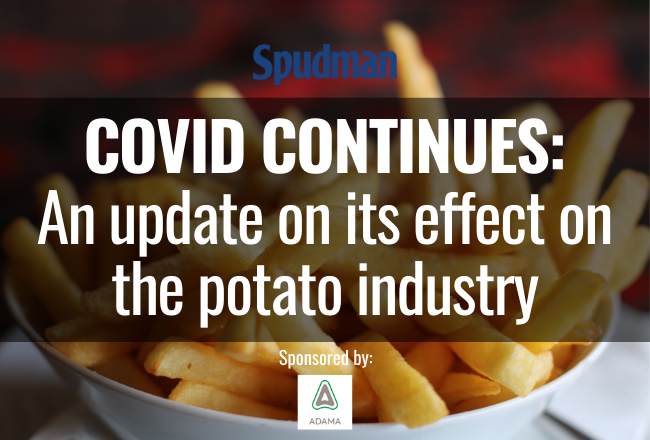
How EU potato producers are coping with COVID impact
It’s not every day you get to meet a world-renowned potato expert in person, especially under current conditions. But the rules around social distancing have relaxed somewhat in Belgium, which allowed me to up meet Romain Cools in person.
We talked about COVID-19’s impact on the Belgian potato market over a cold beer for over two hours. Cools is perhaps the most qualified person to break down how COVID-19 impacted the Western European potato market. He’s President and CEO of World Potato Congress and Secretary General of Belgapom, the trade association that defends the interests of Belgium’s potato trade and processing sectors. He’s a livelong “potato guy” who has served as Secretary General of the European Potato Trade Association, Europatat, and as Secretary General of the European Potato Processors’ Association (EUPPA). In a nutshell, he knows his stuff.

Cases of COVID-19 first began to appear in Belgium in February, but the government didn’t start taking serious action until mid-March when it shut down schools and all restaurants, bars and cafes. In the ensuing weeks, all services but grocery stores, pharmacies, home delivery and public transportation shut down completely. Residents were told to stay indoors in lockdown as the authorities monitored the severity of the pandemic. Restaurants, bars and cafes reopened on June 8, but with restrictive protocols in place.
Belgium’s potato market was hit before the regulations began, though. In the beginning of March, there was no Belgapom price quote for free market potatoes. Reefer containers were stuck in Asia, and exports to that region of the world dropped. On top of that, free market potato purchases dropped.
Following that, export markets for frozen potato products also collapsed, as sales to the country’s two largest customers — Brazil and the Gulf states — slowed to a halt. Exports outside of Europe represent one-third of the market. The other two-thirds of frozen potato products are delivered within Europe, of which the biggest customers are France and the UK.
RELATED: U.S. potato industry still feeling effects of foodservice shutdowns
Nearly immediately, Belgapom made an agreement to respect contracts with its potato growers in Belgium and the north of France, which represents 60-70% of the market. Contract prices were high last year, said Cools. But they are much more volatile than they are in the U.S. and Canada, he added. Free market potato prices were also very good, which left farmers feeling confident at the time. When the industry gave priority to contracts, though, the free market collapsed, dropping to zero.
Fallout
In Belgium, farmers sign tonnage contracts instead of contracts based on hectares like they do in The Netherlands. The rest of their crop goes to the free potato market. All contract farmers in Belgium belong to the free market as well. On April 1, Cools said some 750,000 tons of potatoes, part of which was destined for the peeling industry, could not be processed.
As of mid-June, only 300,000 of the original 750,000 tons remained. Part of this can be attributed to dry weather, which has led to very low yield expectations for cattle feed. As a result, huge volumes have been sold as cattle feed, said Cools. Some tonnage was delivered to Africa and Central Europe where there were shortages. They were sold at extremely low prices, though. About 1,000 tons were delivered for free to local food banks.
“What we tried to set up was an approach that was pretty sustainable,” said Cools. “Food, feed, green energy.”
Some farmers sold their potatoes at the gate.
In January, all parts of the Belgian potato supply chain joined forces to create a new professional organization called Belpotato.be. The goal of the organization, which also includes farmers’ unions, is to work out solutions to mutual problems. They also worked with colleagues in France, The Netherlands and Germany, as well.
One of the mutual problems was the financial loss faced by farmers. Dutch farmers received €50 million in aid (about $56 million). Cools said they used this number to put pressure on the Belgian governments in regions of Flanders and Wallonia. The Wallonian government, however, sees the potato sector as wealthy and prefers instead to provide aid to the beef sector.
The Flemish government, on the other hand, came up with two schemes. The first is a top-on subsidy totaling €25 million from Europe under the Common Agricultural Policy. About €13 million will also go to farmers who have potatoes in their crops. Out of the Corona emergency fund, Flemish potato farmers will get an additional €10 million for losses to free market potatoes only. Those farmers will receive, on average, €50/ton. By contrast, contracts received €150/ton. Currently, the free market price is €30/ton, which means farmers are losing at least €70/ton, regardless of aid.
French potatoes also received €10 million in aid, said Cools. No aid was given to German or British potato farmers.
Belgian farmers also reduced production of frozen potato products by 20-30%. A number of companies also reduced contracts on early potatoes.
In May, international NGO Too Good To Go launched the national campaign “SOS Patat: Save the potatoes, eat fries.” The campaign urged Belgians to buy and consume an extra portion of frozen potato products at their local grocery store to help make space in the frozen processing sectors’ freezers. This would allow them to process extra tons of potatoes while waiting for the food service sector to reopen.
The campaign was created in collaboration with Belpotato.be, Belgapom, Comeos and a number of retailers, Unizo, the Belgian potato processing industry and the promotion boards VLAM and APAQ-w.
The plea worked. Sales of frozen potato products increased at the retail level by 30%. On top of that, fresh potato sales rose by more than 100% at the retails level. With the reopening of restaurants, Cools said retail sales are returning to normal now.
— This is the latest article in Spudman’s Global Perspectives series, which looks at developments around the world and how they may effect the U.S. industry.







